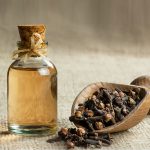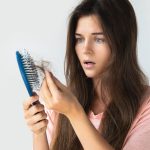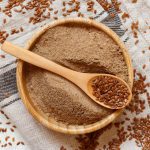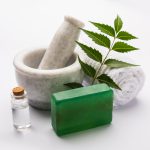Alarm bells inevitably tend to go off when you see your child scratching their head.…
Read MoreSometimes hair loss can be caused by fairly simple things like hot oil hair treatments, or hairstyles that pull your hair too tight but sometimes they can also point to deeper problems. For instance, poor nutrition and emotional or physical stress can lead to hair loss. As can hormonal changes due to thyroid problems, pregnancy, and menopause. Medical conditions such as alopecia areata (which is a disorder related to the immune system) and scalp infections as well as certain medicines used to treat arthritis, heart problems, depression, gout, high blood pressure and cancer can also cause hair loss.[1][Hair loss](https://www.mayoclinic.org/diseases-conditions/hair-loss/symptoms-causes/syc-20372926 “Hair loss”).Mayo Clinic.
According to ayurveda, your hair is a by-product of your bone tissue and it’s also linked to your gut and central nervous system. Consequently, weaknesses of the bone tissue, digestive system, or nervous system can lead to hair loss.
An imbalance in the doshas (vata, pitta, and kapha) can cause issues in these systems which in turn will reflect on the health of your scalp and hair.
Let’s take a look at a few natural remedies that can help you tackle hair loss:
Research shows that onion juice can help hair grow faster. A study that looked at the effect of applying onion juice on people suffering from alopecia areata found it to be beneficial. Alopecia areata is a condition where people lose hair in patches because their immune system attacks their hair follicles. During the course of the study they found that 86.9% of the participants who applied onion juice experienced hair regrowth compared to only 13% of those who had applied plain tap water.[2][Alopecia Areata](https://www.niams.nih.gov/health-topics/alopecia-areata “Alopecia Areata”).National Institutes of Health. [3]Sharquie, Khalifa E., and Hala K. Al‐Obaidi. “Onion juice (Allium cepa L.), a new topical treatment for alopecia areata.” The Journal of dermatology 29, no. 6 (2002): 343-346. So, if you’re worried about hair loss, onion juice could be your savior!
Precaution: Test all new hair care ingredients on a small patch of skin first to make sure that you do not react adversely to it before applying it on your scalp.
Amla oil has traditionally been used to promote hair health and growth. In fact, according to ayurveda it’s also an excellent remedy for premature graying. Research shows that amla inhibits an enzyme called 5α-reductase which can impact your hormones and promote hair loss.[4]Kumar, Naphatsorn, Wandee Rungseevijitprapa, Nual-Anong Narkkhong, Maitree Suttajit, and Chaiyavat Chaiyasut. “5α-reductase inhibition and hair growth promotion of some Thai plants … Continue reading
Precaution: Test all new hair care ingredients on a small patch of skin first to make sure that you do not react adversely to it before applying it on your scalp.
Rice water has a long history of use as a beauty treatment for hair in Chinese and Japanese traditions. And this tradition is backed up by scientific research too. Studies have found that rice water can improve hair elasticity and reduce surface friction. Mineral extracts from rice bran have also been found to prolong the growth phase (anagen phase) of hair.[5]Kim, Yu-Mi, Soon-Joung Kwon, Hyun-joon Jang, and Young-Kwon Seo. “Rice bran mineral extract increases the expression of anagen-related molecules in human dermal papilla through wnt/catenin … Continue reading Moreover, amino acids present in rice are thought to strengthen hair roots while a carbohydrate known as inositol is thought to make your hair stronger. It can also add a layer of protection against environmental factors like pollution and keep your hair looking shiny and smooth. So, there you go – stronger hair, improved texture and elasticity, and less friction and frizz![6] Barsagade, Prachi D., Pranali Patil, and Milind J. Umekar. “A FORMULATION OF FACE PACK AND HAIR PRODUCTS OF RICE WATER FOR THE USE OF SKIN AND HAIR PROBLEM.” (2020).
Precaution: Test all new hair care ingredients on a small patch of skin first to make sure that you do not react adversely to it before applying it on your scalp.
In ayurveda, brahmi is used to deal with alopecia areata, anxiety, and dandruff. It is considered to be helpful in soothing pitta dosha and reducing stress and tension. Brahmi oil is thought to nourish the scalp and stimulate and strengthen hair follicles to promote hair growth. Research shows that the application of brahmi oil can promote hair growth.[7]Banerjee, Pooja S., Megha Sharma, and Rajesh Kumar Nema. “Preparation, evaluation and hair growth stimulating activity of herbal hair oil.” Journal of Chemical and Pharmaceutical Research … Continue reading In fact, one study even found that a formulation containing brahmi, amla, methi, and meetha neem was comparable in efficacy to a medication used for treating hair loss.[8]Purwal, Lipi, Surya Prakash BN Gupta, and S. Milind Pande. “Development and evaluation of herbal formulations for hair growth.” E-Journal of Chemistry 5, no. 1 (2008): 34-38.
However, those prone to colds, should apply the oil and leave it on for an hour and then rinse it off.
Precaution: Test all new hair care ingredients on a small patch of skin first to make sure that you do not react adversely to it before applying it on your scalp.
Bhringraj has been used to prepare hair oils in ayurveda for centuries. It is thought to deep condition your hair, as well as prevent hair fall and premature graying of hair. It is also considered beneficial for dealing with dandruff. One study found that the application of bhringraj reduced the time taken for the growth of new hair as well as the time taken to complete hair growth significantly. A compound called β-sitosterol present in this herb is thought to contribute to this beneficial effect.[9]Roy, R. K., Mayank Thakur, and V. K. Dixit. “Hair growth promoting activity of Eclipta alba in male albino rats.” Archives of dermatological research 300, no. 7 (2008): 357-364. To take advantage of the hair growth promoting properties of bhringraj you can apply either bhringraj oil or use a hair mask.
Some experts also suggest leaving it in overnight, however this can worsen sinusitis for some people.
Precautions:
Almond oil can give you shiny lustrous hair – it has nourishing properties. Massaging it into your scalp and hair can help reduce hair breakage, dry roots, an itchy scalp, and split ends. One animal study found that the topical application of almond nut extracts was effective at promoting hair growth. Though the exact mechanism through which almonds work has not been identified these nuts do contain beneficial fatty acids like myristic, oleic, palmitic, and linoleic acids.[11]Suraja, R., G. Rejitha, Sunilsona B. Anbu Jeba, K. Anandarajagopala, and P. Promwichita. “In vivo hair growth activity of Prunus dulcis seeds in rats.” Biol Med 1, no. 4 (2009): 34-8.
Precaution: Test all new hair care ingredients on a small patch of skin first to make sure that you do not react adversely to it before applying it on your scalp.
Tea tree oil is not traditionally used to promote hair growth. However, it can be used to tackle certain conditions which can lead to hair loss. For instance, it has powerful antifungal and antiseptic properties and has been used to treat ringworm. Some experts also suggest that its anti-inflammatory properties make it beneficial for tackling psoriasis. And both ringworm and scalp psoriasis can lead to hair loss.[12] Pazyar, Nader, and Reza Yaghoobi. “Tea tree oil as a novel antipsoriasis weapon.” Skin pharmacology and physiology 25, no. 3 (2012): 162-163. [13]Flores, F. C., J. A. De Lima, Roseane Fagundes Ribeiro, S. H. Alves, C. M. B. Rolim, Ruy Carlos R. Beck, and Cristiane Bona Da Silva. “Antifungal activity of nanocapsule suspensions containing … Continue reading [14][ SCALP PSORIASIS: 10 WAYS TO REDUCE HAIR LOSS](https://www.aad.org/public/diseases/psoriasis/treatment/genitals/scalp-hair-loss “SCALP PSORIASIS: 10 WAYS TO REDUCE HAIR LOSS”). American Academy … Continue reading
Precautions:
Apple cider vinegar is often used as a cleansing rinse for hair. It can help clear hair products, dirt, dead skin, and oil which has built up on your scalp and maybe clogging your hair follicles. Moreover, it has an antifungal effect and inhibits the growth of the fungus Malassezia furfur. This fungus infects the scalp and can cause dandruff.[17]Arun, PV Parvati Sai, Yaralagadda Vineetha, Maseera Waheed, and Koka Ravikanth. “Quantification of the minimum amount of lemon juice and apple cider vinegar required for the growth inhibition … Continue reading Malassezia also causes oxidative damage which plays a role in premature hair loss.[18]Trüeb, Ralph M., Jim P. Henry, Mike G. Davis, and Jim R. Schwartz. “Scalp condition impacts hair growth and retention via oxidative stress.” International journal of trichology 10, no. 6 … Continue reading
Precaution: Test all new hair care ingredients on a small patch of skin first to make sure that you do not react adversely to it before applying it on your scalp.
Jonk oil or leech oil is also widely used for promoting hair growth. It is thought to strengthen hair follicles and promote hair growth. It is also thought to moisturize dry and brittle hair as well as add shine. Though there isn’t a lot of scientific research on the efficacy of leech oil in promoting hair growth one animal study did find a poly herbal formulation containing leech as well as other ingredients such as onion, hibiscus, and beehive to be effective. In fact, this polyherbal oil was found to be more effective than a medication used for treating hair loss. During the study, the polyherbal oil was applied daily for 40 days.[19]Nikita, Saraswat, Pal S. Rashmi, Pal Yogendra, Wal Pranay, Wal Ankita, and A. K. Rai. “Poly Herbal Hair Oil Preparation, Standardization, Treatment and Evaluation for Alopecia in Male Wistar … Continue reading
Precaution: Test all new hair care ingredients on a small patch of skin first to make sure that you do not react adversely to it before applying it on your scalp.
Here are a few elements that should ideally be a part of your hair care routine:
References
| ↑1 | [Hair loss](https://www.mayoclinic.org/diseases-conditions/hair-loss/symptoms-causes/syc-20372926 “Hair loss”).Mayo Clinic. |
|---|---|
| ↑2 | [Alopecia Areata](https://www.niams.nih.gov/health-topics/alopecia-areata “Alopecia Areata”).National Institutes of Health. |
| ↑3 | Sharquie, Khalifa E., and Hala K. Al‐Obaidi. “Onion juice (Allium cepa L.), a new topical treatment for alopecia areata.” The Journal of dermatology 29, no. 6 (2002): 343-346. |
| ↑4 | Kumar, Naphatsorn, Wandee Rungseevijitprapa, Nual-Anong Narkkhong, Maitree Suttajit, and Chaiyavat Chaiyasut. “5α-reductase inhibition and hair growth promotion of some Thai plants traditionally used for hair treatment.” Journal of ethnopharmacology 139, no. 3 (2012): 765-771. |
| ↑5 | Kim, Yu-Mi, Soon-Joung Kwon, Hyun-joon Jang, and Young-Kwon Seo. “Rice bran mineral extract increases the expression of anagen-related molecules in human dermal papilla through wnt/catenin pathway.” Food & nutrition research 61, no. 1 (2017): 1412792. |
| ↑6 | Barsagade, Prachi D., Pranali Patil, and Milind J. Umekar. “A FORMULATION OF FACE PACK AND HAIR PRODUCTS OF RICE WATER FOR THE USE OF SKIN AND HAIR PROBLEM.” (2020). |
| ↑7 | Banerjee, Pooja S., Megha Sharma, and Rajesh Kumar Nema. “Preparation, evaluation and hair growth stimulating activity of herbal hair oil.” Journal of Chemical and Pharmaceutical Research 1, no. 1 (2009): 261-267. |
| ↑8 | Purwal, Lipi, Surya Prakash BN Gupta, and S. Milind Pande. “Development and evaluation of herbal formulations for hair growth.” E-Journal of Chemistry 5, no. 1 (2008): 34-38. |
| ↑9 | Roy, R. K., Mayank Thakur, and V. K. Dixit. “Hair growth promoting activity of Eclipta alba in male albino rats.” Archives of dermatological research 300, no. 7 (2008): 357-364. |
| ↑10 | [The Health Benefits of Bhringraj Oil](https://www.verywellhealth.com/the-benefits-of-bhringaraj-oil-88825 “The Health Benefits of Bhringraj Oil”).Verywell Health. |
| ↑11 | Suraja, R., G. Rejitha, Sunilsona B. Anbu Jeba, K. Anandarajagopala, and P. Promwichita. “In vivo hair growth activity of Prunus dulcis seeds in rats.” Biol Med 1, no. 4 (2009): 34-8. |
| ↑12 | Pazyar, Nader, and Reza Yaghoobi. “Tea tree oil as a novel antipsoriasis weapon.” Skin pharmacology and physiology 25, no. 3 (2012): 162-163. |
| ↑13 | Flores, F. C., J. A. De Lima, Roseane Fagundes Ribeiro, S. H. Alves, C. M. B. Rolim, Ruy Carlos R. Beck, and Cristiane Bona Da Silva. “Antifungal activity of nanocapsule suspensions containing tea tree oil on the growth of Trichophyton rubrum.” Mycopathologia 175, no. 3-4 (2013): 281-286. |
| ↑14 | [ SCALP PSORIASIS: 10 WAYS TO REDUCE HAIR LOSS](https://www.aad.org/public/diseases/psoriasis/treatment/genitals/scalp-hair-loss “SCALP PSORIASIS: 10 WAYS TO REDUCE HAIR LOSS”). American Academy of Dermatology Association. |
| ↑15 | Olsen, Cynthia B. Australian tea tree oil guide: First aid kit in a bottle. Lotus Press, 2003. |
| ↑16 | [The Health Benefits of Tea Tree Oil](https://www.verywellhealth.com/benefits-of-tea-tree-oil-89521 “The Health Benefits of Tea Tree Oil”).Verywell Health. |
| ↑17 | Arun, PV Parvati Sai, Yaralagadda Vineetha, Maseera Waheed, and Koka Ravikanth. “Quantification of the minimum amount of lemon juice and apple cider vinegar required for the growth inhibition of dandruff causing fungi Malassezia furfur.” Int. J. Sci. Res. in Biological Sciences Vol 6 (2019): 2. |
| ↑18 | Trüeb, Ralph M., Jim P. Henry, Mike G. Davis, and Jim R. Schwartz. “Scalp condition impacts hair growth and retention via oxidative stress.” International journal of trichology 10, no. 6 (2018): 262. |
| ↑19 | Nikita, Saraswat, Pal S. Rashmi, Pal Yogendra, Wal Pranay, Wal Ankita, and A. K. Rai. “Poly Herbal Hair Oil Preparation, Standardization, Treatment and Evaluation for Alopecia in Male Wistar Rats.” Research Journal of Pharmacy and Technology 12, no. 2 (2019): 757-763. |
| ↑20 | [How to Keep Your Hair Healthy This Winter](https://health.clevelandclinic.org/your-best-strategies-for-beautiful-hair-in-the-winter/ “How to Keep Your Hair Healthy This Winter”). Cleveland Clinic. |
| ↑21 | Ande, Amar N., and Swati K. Chobhe. “PDEAS International Journal of Research in Ayurved & Allied Sciences.” |
| ↑22 | [Hair Loss](https://www.health.harvard.edu/a_to_z/hair-loss-a-to-z “Hair Loss”). Harvard Health Publishing. |
| ↑23 | [Protein]( https://www.betterhealth.vic.gov.au/health/healthyliving/protein “Protein”).Better Health Channel. |
| ↑24 | [Iron](https://ods.od.nih.gov/factsheets/Iron-Consumer/ “Iron”). National Institutes of Health. |
| ↑25 | [Biotin](https://ods.od.nih.gov/factsheets/Biotin-Consumer/ “Biotin”). National Institutes of Health. |
| ↑26 | [Zinc](https://ods.od.nih.gov/factsheets/Zinc-Consumer/ “Zinc”). National Institutes of Health. |


Dr. Manjula has 12 years of experience in the field of Ayurveda and worked as a Consultant and General Physician for over 5 years before starting her private practice. In addition to BAMS, she also has an Advanced Diploma in Clinical Research and is trained in Panchkarma. She is an expert at diagnosis of the root cause and planning effective treatment for multiple issues.

Alarm bells inevitably tend to go off when you see your child scratching their head.…
Read More
We can’t help but get a little worried when we notice hair falling out as…
Read More
Don’t we all feel a tinge of envy when we see a shampoo ad? Who…
Read More
We all want to have healthy, beautiful hair. But sometimes harsh chemical products can do…
Read More